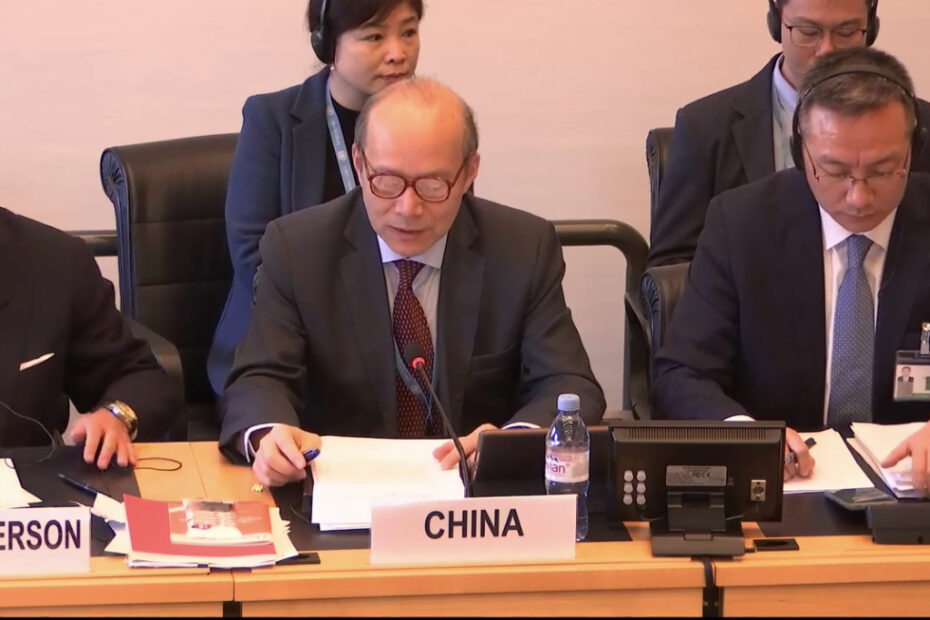16 February 2023
[Geneva] A delegation of almost 40 Chinese government officials appeared before the UN Committee on Economic, Social and Cultural Rights (CESCR) [1] for an intense two-day review by UN rights experts. Tibet Advocacy Coalition representatives, who submitted evidence to the Committee, were in Geneva to witness the proceedings.
Today the Committee questioned the delegation over the almost one million Tibetan children who have been separated from their families and communities and coerced into residential schools. [2] The Committee added that “Tibetan children as young as four to six are being sent to boarding schools where they are completely deprived of access to their language and their culture.”
The UN experts reiterated the strong concerns of various other UN Committees and human rights bodies [3] about Tibetan language erosion “in the push for a unified curriculum and the national common language policy” that has resulted in Tibetan being replaced by Chinese as the medium of instruction in schools throughout Tibet, including in kindergartens. [4]
The UN Committee challenged China’s claims that residential boarding schools in Tibet exist to cater to a scattered population with economic difficulties, requesting evidence to show how this claim can be reconciled with the reality that at least 78% of all Tibetan children aged 6-18 years old are living in residential schools.
In response to the Committee’s human rights concerns, the Chinese delegation raised a number of spurious claims, including that math and science were taught in Mandarin because Tibetans lacked the “right terminology” to learn those subjects in their mother tongue.
There was not a single Tibetan or Uyghur in the nearly 40-person Chinese delegation, nor were there any delegates representing those areas. There were ten delegates from the Hong Kong Special Administrative Region, three from the Macao Special Administrative Region, and no delegates from Tibet or East Turkistan (Ch: Xinjiang).
Gloria Montgomery, Coordinator of Tibet Advocacy Coalition, said: “The breadth and strength of the concerns raised by the UN Committee over residential schools in Tibet is a forceful reminder that China’s human rights violations and assimilationist policies in Tibet will not go uninvestigated – or unpunished. China has bulldozed over the rights of Tibetan children for too long, in an effort to entirely strip the new generation of their Tibetan culture, language and religion. The independent experts have played a crucial role in spotlighting these urgent concerns, and have placed them firmly and unequivocally on the UN’s agenda.”
Lhadon Tethong, Director of Tibet Action Institute, said:
“China spent far more time attempting to justify the fact that the vast majority of Tibetan children now live in colonial boarding schools rather than disputing their overwhelming numbers and shockingly young ages. They exhibited a complete lack of awareness of the international consensus that colonial boarding schools are a genocidal tool used to extinguish distinct nations and peoples.”
Topjor Tsultrim, Campaigns Director of Students for a Free Tibet, said:
“China must be held accountable to international human rights standards. It’s one thing to read the UN experts’ communications on China’s human rights violations and forced assimilation policies in Tibet, but the impact of the Chinese government being questioned directly is enormous.”
Mandie McKeown, Executive Director of International Tibet Network, said:
“Since China’s last Review in 2014, the situation in Tibet has deteriorated at an alarming rate and looks set to continue on a downward spiral. The Committee has put China’s assimilationist policies under the microscope and given Beijing a strong push to implement serious changes in line with international standards.”
CONTACTS:
Gloria Montgomery, Tibet Advocacy Coalition: +44 7541 362001
Lhadon Tethong, Tibet Action Institute: +1 917-418-4181
Topjor Tsultrim, Students for a Free Tibet: +1 610-745-1022
Mandie McKeown, International Tibet Network: +44 7748 158618
NOTES TO EDITORS:
[1] The Committee on Economic, Social and Cultural Rights (CESCR) is the body of 18 independent experts that monitors implementation of the International Covenant on Economic, Social and Cultural Rights by its State parties. The Covenant enshrines economic, social and cultural rights such as the rights to adequate food, adequate housing, education, health, social security, water and sanitation, and work. The Committee seeks to develop a constructive dialogue with State parties, determine whether the Covenant’s norms are being applied, and assess how the implementation and enforcement of the Covenant could be improved so all people can enjoy these rights in full.
[2] Tibet Action Institute, “Separated From Their Families, Hidden From the World: China’s Vast System of Colonial Boarding Schools Inside Tibet,” 2021, pg. 24, available at: https://s7712.pcdn.co/wp-content/uploads/2022/01/2021_ColonialBoardingSchoolReport_Digital.pdf
[3] Special Procedures Communication, 11 November 2023: https://spcommreports.ohchr.org/TMResultsBase/DownLoadPublicCommunicationFile?gId=27444; Committee on the Elination of Racial Discrimination, September 2018, https://www.ohchr.org/en/documents/concluding-observations/cerdcchnco14-17-concluding-observations-combined-fourteenth
[4] Human Rights Watch, ‘China’s “Bilingual Education” Policy in Tibet Tibetan-Medium Schooling Under Threat’ 4 March 2020, https://www.hrw.org/report/2020/03/04/chinas-bilingual-education-policy-tibet/tibetan-medium-schooling-under-threat
